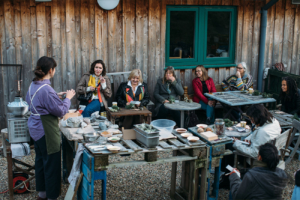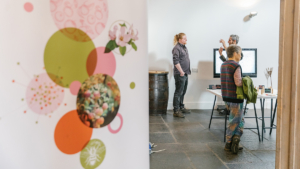The Barn

Visual artist Ieva Grigelionyte translating weather and mood into ice cream at Phosphorescence Dance Festival, 2021.
Co-creation invites us to look into the world beyond ourselves. In the best of cases, the outcomes are transformational. This is what the Barn, a farm-turned-multi-arts-centre in Scotland, invites its local community to do. It provides artistic and communal experiences for people to learn and discover new ideas that may change how we act within a world in crisis.
For the Barn, the climate emergency is so profound and engrained in every other crisis that it should garner all our attention. Based in rural Aberdeenshire, the Barn is surrounded by agricultural communities and people impacted by Aberdeen being the ‘oil capital of Europe’. As they describe, the culture of oil creates a sense of perceived wealth that flows through and out of the city. A lot is changing for these communities as society transitions to renewables, ecological approaches to agricultural developments and environmentally conscious ways of living.
The Barn is reflecting its community’s needs by transitioning from being a receiving house to a centre of learning and inspiration– about the environment, through the arts.
Since the early 1990s, the Barn has championed environmental mindfulness. Their ethos is all about closing the gap between the systems of the world we live in, from day to day and the world we live from, that we resource from elsewhere. They enable their local communities to engage in co-creative projects that cultivate environmental awareness and encourage impactful actions around care and learning. Creating awareness and change are essential to how they work – from their first project being a communal play, and now having expanded into a multi-arts centre.
One of their most impactful projects is The Far Orchard, a reimagining of the traditional orchard developed by artists Robbie Coleman and Jo Hodges. The project is a collection of 100 apple trees distributed across the local town of Banchory to care homes, schools, and private gardens. Each tree is ‘hosted’ and taken care of by individuals from the community indefinitely, transcending generations.
The Far Orchard creates links between ‘hosts’ connecting them as a community of ‘pollinators’ who discuss challenges and successes of their labour of love. The most powerful lesson of the project is the simple act of taking responsibility for a tree. We might think there is not much to learn from an apple tree, but the idea of grandeur over the environment is what The Far Orchard proposes we must re-evaluate.
Talking with The Barn’s Head of Creative Programme, Simone Stewart, she explains that “It gets people to observe what is growing, and that process of deep observation reveals different forms of learning through sensory experiences of touching, sensing, tasting and making.”

Conversations with The Far Orchard artists, Jo Hodges and Robbie Coleman at Plenty? Festival 2022.
Co-creating with people and the land
Simone discussed how the most rewarding aspect of the work is “the co-creative process and how this helps communities consider the leap of imagination made necessary by the environmental crisis” for projects such as The Far Orchard. The Barn understands that artistic proposals in rural areas such as Aberdeenshire cannot be void from their context. For the Barn’s work to be transformational for both individuals and their surroundings it needs to happen through a process of co-creation. Co-creation between people, and co-creation with the land itself.
The Barn continues to develop projects such as Growing Together Day and Becoming Earthly that cultivate actions to live sustainably, using art as a medium and the local community as its producers. Describing how they understand impact, Simone asks: “Does our creative practice give back more to the web of life than we consume? That should be the primary measure of success.”
By Barbara Henry, Cultural & Creative Industries MA student at King’s College London.
Other case studies